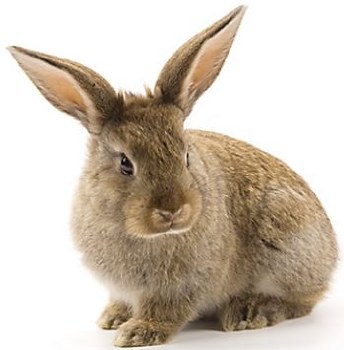Bunny
Item Number: SM34
See other items by Apet
$58.99
Rabbits are some of the most familiar small animals. Not only are they often seen in nature, but they also prominently feature in literature and animation. As pets, they can be playful and affectionate, although some breeds are not; some are territorial and will bite a hand in their cage. Experts tend to agree that rabbits aren’t good pets for small children. For one thing, they don’t like to be held for extended periods. Also, when restrained too long, a rabbit may bite, kick, or scratch until he is free.
Rabbits are social creatures—two will groom each other and play and rest together. However, if you haven’t kept rabbits before, it is best to only keep one. Depending on the breed, a rabbit can weigh 2½ to 16 pounds (1 to 7 kg) and can live from 7 to 10 years.
Natural History
Rabbits are found throughout the world, from the Arctic to the tropics. At least 49 species are known. Wild rabbits have an interesting array of adaptations. Some molt into a white coat in the fall and into a brown coat in the spring, some are good swimmers, and some can reach speeds of 30 to 35 miles per hour (48 to 56 km/hour) over short distances.
About 3,000 years ago, they were traded for meat and fur. During the Middle Ages, French monks kept them in cages and bred them. Domesticated rabbits became heavier and meatier and were not afraid of humans. They were also selectively bred to develop colors, such as albino, blue, and yellow, that did not occur in the wild.
Enclosures and Setup
Because they are so highly adaptable, some rabbits can live in a cage outdoors. You can also keep rabbits inside, which is actually a better idea. Your pet will be safer, and there’s more opportunity for him to interact with you and your family.
Indoor rabbits need a cage that provides maximum floor space. They are not jumpers or climbers, so a tall cage isn’t necessary. Rabbit cages have three types of flooring: wire mesh, slat, or solid. Wire floors allow droppings and urine to fall so that the rabbit stays clean. Slat flooring won’t irritate your rabbit’s feet like wire mesh will, and wastes will also fall through the openings. Solid floor cages are designed for use with a litter box. Wastes will, of course, accumulate with this last floor type.
Bedding and litter must be utilized. You also need to provide a nest box for sleeping and security, two food dishes (one for food, the other for hay), a water bottle, and toys.
Diet
Rabbits are strictly vegetarians and need a high-fiber diet. Dry pellets formulated for rabbits are commonly sold in pet stores. Supplement this food with loose hay, which will provide your pet with the fiber he needs to digest his food properly. Fresh fruits and vegetables, like carrots, celery, apples, pineapple, and many others, are good choices for a rabbit. Do not feed sugary fruits too often because they can make your pet overweight.
Grooming
Rabbits must be brushed regularly, sometimes once a week. Use a soft-bristle or rubber brush, and don’t brush too hard—rabbits have sensitive skin. Gently brush the fur in the direction it grows.
The best time to clip your rabbit’s nails is when he is tired, not when he is awake and playful. Using two people is usually best—one to hold the rabbit and one to clip the nails.
Allowing your rabbit to groom himself is better than giving him a bath. Extended exposure to water will cause him stress and he may fall ill. If you must use water to clean your rabbit, do a “spot treatment” and dry the area immediately.
Health and Illness
A dramatic change in your rabbit’s behavior is a telltale sign that something is wrong. Other obvious signs include a runny nose, watery eyes, and labored breathing. Diarrhea and constipation are also symptoms. Rabbits like to keep themselves clean, so a dirty, matted coat means something is wrong.
Rabbits can come down with infections and parasites, and they can be injured as well. If you notice something wrong, contact your veterinarian immediately.
A rabbit produces copious waste matter, so you will have to change your pet’s bedding and clean his cage regularly. Keeping your rabbit’s cage clean will help prevent many health problems.

Share: